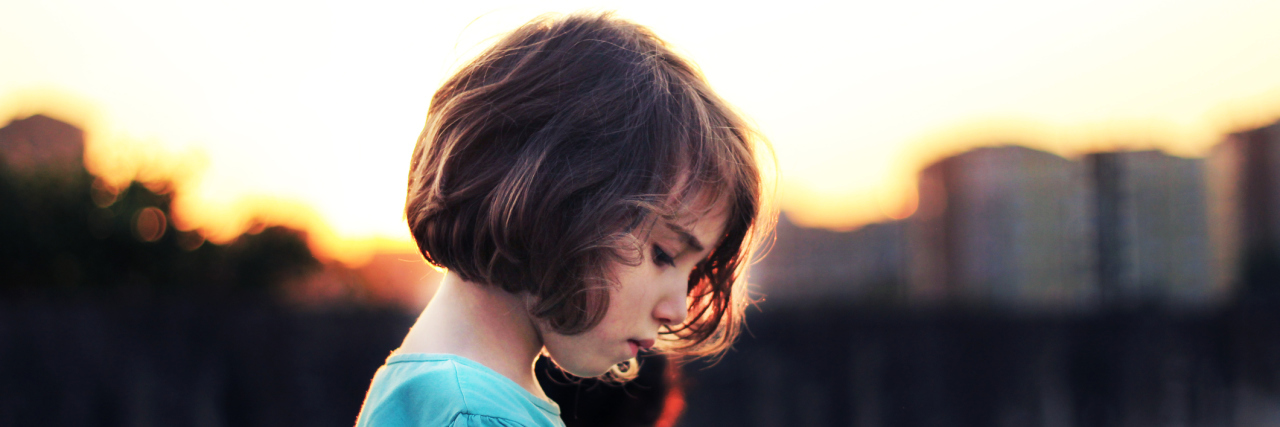Ever since I was little, there had always been something “off” about me. I had very few friends in primary school, matured very quickly and would go through “phases” — from heavy rock bands to “High School Musical.” Every month of the year there was a new phase for me to tell my friends about. I was also an extremely anxious child, and the smallest thing would cause a tight feeling in my chest that would linger until I was in my safe place. Travel, change and throwing up were among my long list of fears, and I learned avoidance from an early age.
I visited CAMHS (Child and Adolescent Mental Health Service) for the first time when I was 7 years old, after I received a diagnosis of generalized anxiety disorder from my GP. The appointments weren’t much use. I was young, so explaining things were difficult and shortly after I was admitted, I was discharged. They didn’t discover the severe OCD I had developed over the years. At the age of 7, I would spend hours doing rituals, repeating phrases and blinking to stop the constant buzz of intrusive thoughts that told me the items in my house would come alive and kill me if I looked at them. I licked my hands whenever I touched something, and flicked a light switch to make sure I wouldn’t die in my sleep.
This OCD got worse quickly. By age 9 I was having disgusting, awful and explicit obsessional intrusive thoughts and was referred yet again to CAMHS. But CAMHS seemed to think these thoughts were just anxiety as I was too scared to explain properly what I was thinking. The last session I had with that particular therapist, I remember
saying that a voice in my head was telling me to jump out my bedroom window. I was devastated — I didn’t want to die. So why was my head telling me I did? The therapist dismissed me after that session, saying it would be best if I went private and suggested some online chat groups instead of investigating whether I had developed OCD, or the fact that because of my multiple difficulties, autism might also be possible. Looking back, it was so obvious. I didn’t even look my therapist in the eye.
Around 11, just as high school started, my mental health deteriorated. I was badly bullied both physically and emotionally by so many different people. I did not fit in at all and I was so sensitive — another clear trait that stems from autism. If only autism in females was recognized more widely and I was diagnosed early, maybe I would have got the support I needed without having to go through the trauma of moving schools to a different county halfway through year seven.
I found amazing friends at my new school, but the intrusive thoughts continued, until they got so severe in year nine that I became extremely depressed. After a incident in which I put myself in danger and was picked up by an ambulance, I was admitted to CAMHS for the third time.
I was quickly diagnosed with OCD and low mood after 13 years of fighting with it alone. I was assigned an absolutely amazing therapist who continues to help me today, and was also prescribed medication. But something still didn’t seem quite right. I didn’t see the world the way other teenagers did. I couldn’t make eye contact. I hated noise. I hated change. I was constantly anxious. I couldn’t understand sarcasm. I struggled to regulate my emotions. I had difficulty with friendships. The list went on. That’s when my therapist and doctor brought up the idea that as well as everything else, I may have autism.
I cried and screamed for hours that night when I got home. I thought about all the stereotypes portrayed in the media and how everybody would hate me and talk about me behind my back, about how I would never be accepted as soon as they found out.
For the most part, I was so wrong.
After a while, I started researching autism in females. As much as I didn’t want it to, everything made sense. My whole life I had been different to others, called “unique,” “strange” or “weird” and this was the reason why. It was like the final piece of the puzzle had been added. And as time went on, I began to accept my diagnosis. I bought items to help me with sensory processing and relaxation. I tried to help myself understand myself. I finally began to realize that yes, I may be different but without autism there would be no Abby. It’s only a small part of me; it doesn’t define me. I felt empowered, like I was worth something after months and months of hating myself.
This brings us to today. I’m still receiving help for my depression and OCD but my mood overall has improved and my mental self-confidence has rocketed. I would even say I was truly happy, a feeling I had not felt for years. Now I know I wasn’t the only one who was different as a child. There are thousands of girls out there like me, girls who have autism, but only a few are diagnosed.
I recently told my group of friends about my autism (despite being petrified) and they were lovely. Nobody was mean, nobody looked down on me and all those days I spent saying I hated myself for who I was were wasted. I finally felt proud to be autistic. Like it wasn’t so bad after all.
My autism diagnosis was never a death sentence. It was the beginning of a new chapter of my life.
We want to hear your story. Become a Mighty contributor here.
Thinkstock photo by Sinan Ayhan.

